This September, Rough Feathers Clothing Co.’s designer Antonio Jones said Memphis was on the cusp of a fashion revolution.
The city has taken hold over the country’s music and entertainment scene at large, and another takeover appears imminent, given the robust talent coming from Bluff City designers. This revolution coincides with a reevaluation of the fashion industry itself.
While 2020 will forever be synonymous with the Covid-19 pandemic, the year also centered many conversations around social justice. As civil unrest brewed around the nation, talk about inequities in law enforcement broadened to encompass various industries.
Fashion, too, has had its share of controversies surrounding diversity and inclusion efforts. And while fashion houses sought to bring more opportunities to designers of color, many designers opted to prepare their own seat at the table.
This shift not only caused more people to support independent designers and brands, but to focus on the talent of locals in their community as well.
The Flyer talked to designers from five Black-owned brands about their respective journeys — and how the city has influenced their style.
ODDS Atelier
Matthew “Matt” Roumain and Cornelius “Kidd” Martin have always been into fashion. The “mid-30”-year-olds have a friendship that has spanned almost two decades and decided when the time was right, they’d either come out with a clothing line together or open up a sneaker store.
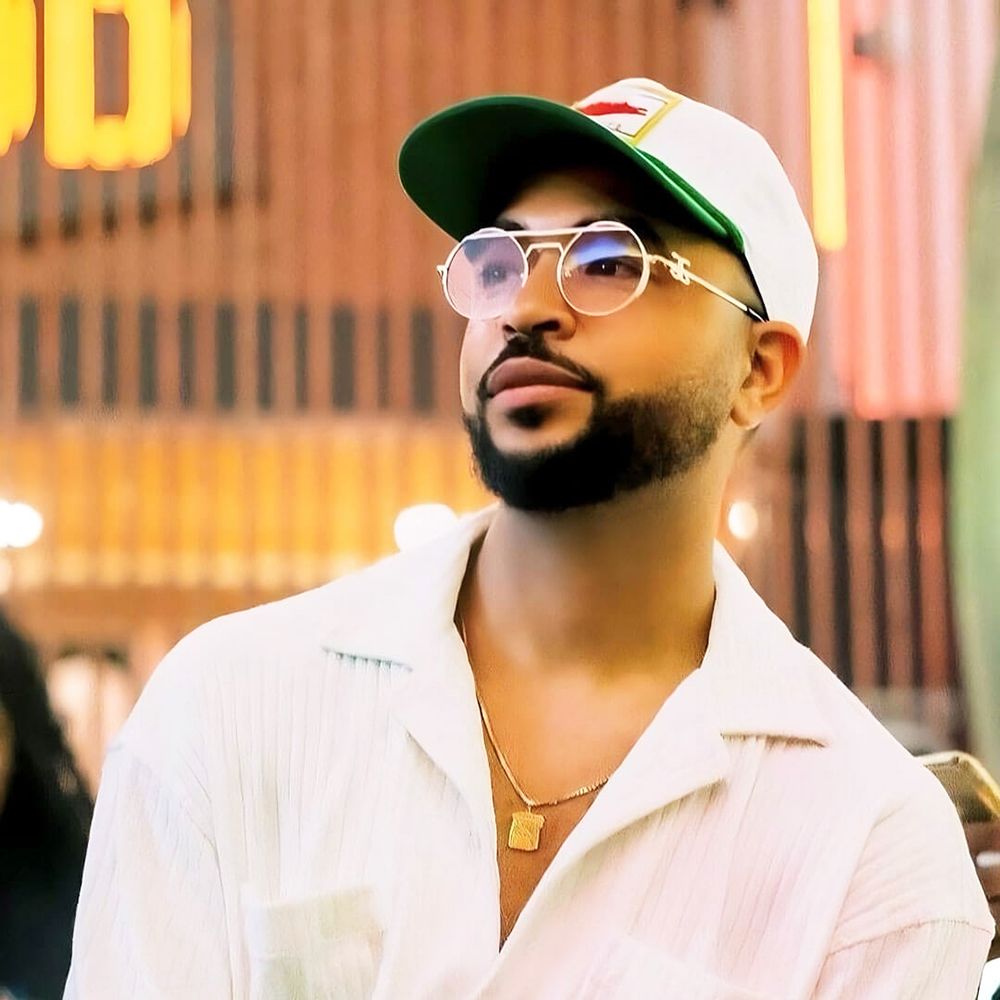
The right time fell in 2020.
Martin notes while they started the build-out of their business, ODDS Atelier, during the pandemic, they didn’t have the opportunity to open “until the pandemic tapered off. … Two weeks into signing the lease, and the world shuts down.”
Like many, the pandemic called for the pair to launch into “scramble mode,” or “the road less traveled,” as they recall. For them, it meant they would have to be more hands-on with their project than expected, but it also led to more innovation and creativity.
Before even starting their business, Roumain and Martin knew intentionality was essential to their “why.” Roumain recalls conversations during their brainstorming process where they said, “If it’s not going to be art, then why even waste our time?”
“Being unique is one thing, but being intentional is another,” says Martin.
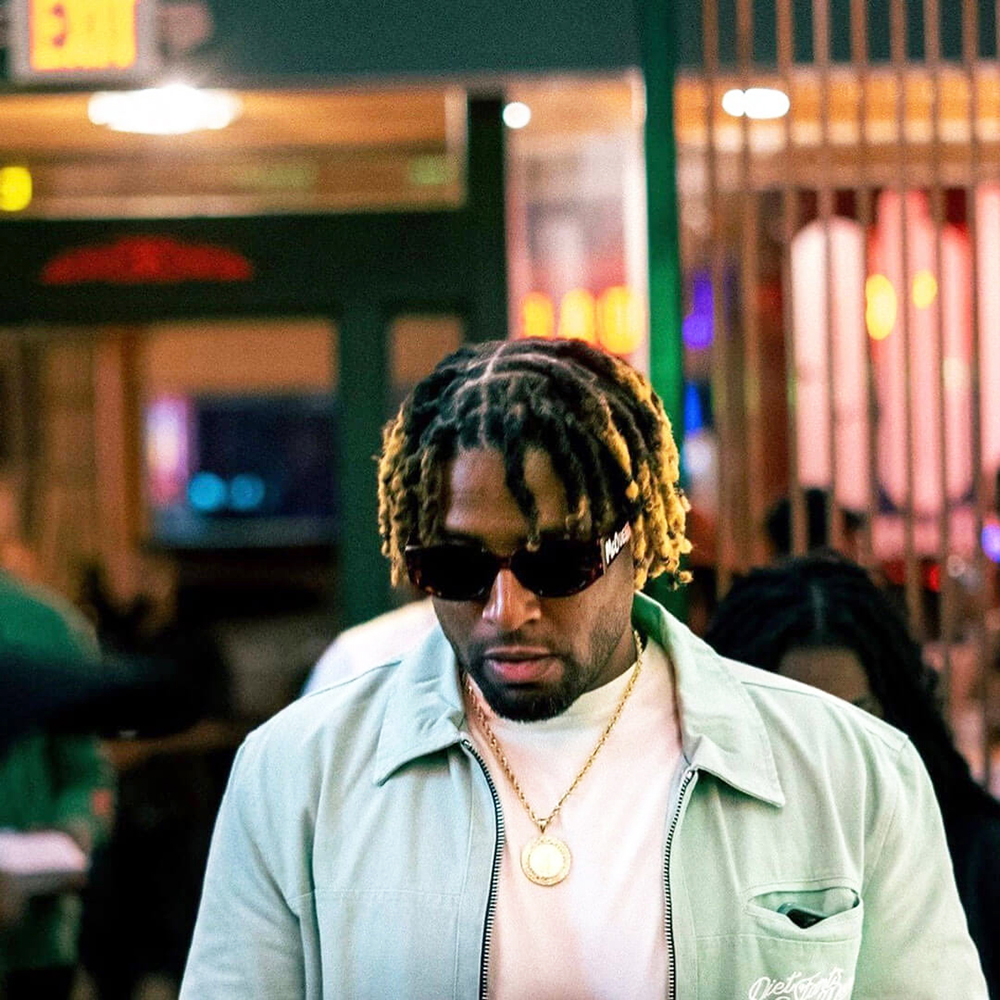
Each piece in ODDS has a bit of the pair’s personality in it, they say. With fashion being such a personal creative outlet, it’s hard not to find an imprint of the designer in the pieces they create. A bulk of their work is influenced by travels and memories.
“I think both of us are very well-read, spiritual, and philosophical,” says Roumain. “When you get into those schools of thoughts, intentions are transferable. The energy you put into something is what’s going to resonate or reverberate. We’re very intentional about using high-quality materials. Attention to detail — having a reason as to why we actually created something. Not just because it’s trendy or in vogue.”
The decision to go atelier style is reflective of this attention to detail. Atelier translates to “workshop” in French, Roumain explains, which is why they opt for a more “industrial” aesthetic in the brick-and-mortar store. “Lots of metals, raw materials, glasses, concrete … they kind of just exist in this cohesive manner that’s infused with art. We just wanted to, you know … tell the story.”
These sentiments are apparent in every component of ODDS, from the copper chandelier made in hopes of bringing good energy to the shop itself, to the decision to call their items “pieces” as opposed to “merch” or “apparel.”
“There’s a space for that,” says Martin. “This just so happened not to be that space. These are pieces. Timeless pieces is what we’re going for.”
ODDS Atelier will release a collaboration with the Memphis Grizzlies’ 191 Collabs on November 24th. For more info, visit oddsatelier.com.
Miles Thomas aka “Hippy”
When Miles Thomas spoke with the Flyer, he described himself as “somebody who is still learning everything to be the best designer I can.”
“I don’t take any of the success that I’ve had so far for granted,” he says. “I think it’s a blessing to be where I’m at, but there’s more that I want, for sure.”
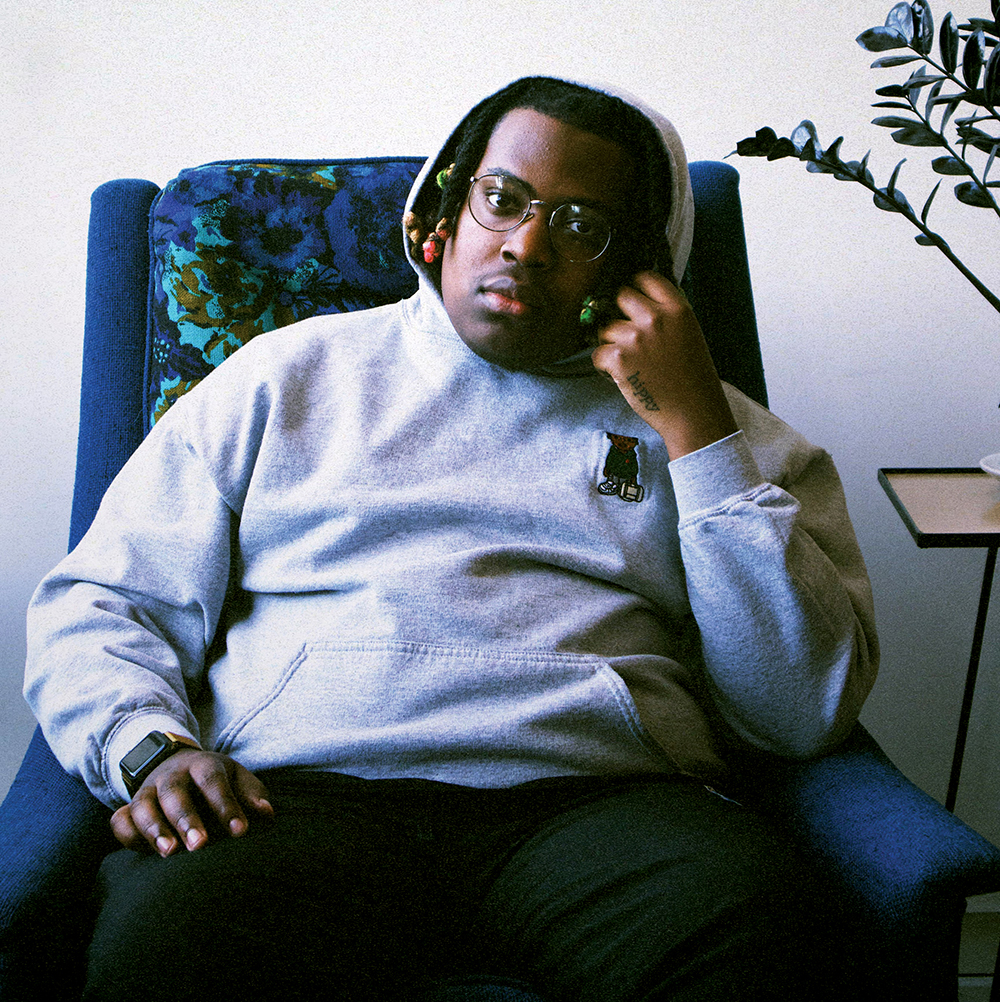
Thomas’ second collection, “In Due Time,” was released in collaboration with the Memphis Grizzlies on October 27th. He released his first collaboration with the team in February of this year.
Aside from “Hippy,” Thomas also touts the nickname “The Hustler,” given by those close in his circle. And with good reason: Most of his opportunities have come from cold calls and emails. That dogged determination paid off with the Memphis Grizzlies, after he’d emailed hoping for a chance to work with them.
Through “the grace of God” and after “months of being in their face,” his moment came. An opportunity to work alongside the team through the 191 Collabs program arose. According to the NBA, the program is in partnership with Hennessy “to celebrate Memphis designers and showcase our city’s unique voice and vibe through hyper-local Grizz garments with double the designers and double the gear.”
In his first collaboration, the 23-year-old knew he wanted to pay homage to the relationship he has with his father, and the role the Grizzlies have played in it. But with his most recent collection, Thomas wanted to tell the story of his trajectory as a designer and what his next steps will be.
“That’s where the name ‘In Due Time’ comes from,” says Thomas. “Due to everybody that told me to ‘just stay down. Your moment will come as long as you keep working.’ If you keep doing the things that you’re doing, in due time, everything will come to pass.”
For his work, Thomas draws inspiration from memories and experiences — being born and raised in Memphis, and interacting with “essentially every part of the city.”
“I went to church in Orange Mound, school in Collierville. I lived in Cordova and would spend time with my dad in East Memphis,” Thomas says. “While Memphis is very connected, each part of the city has its own flavor. I think I’ve been able to take in the flavor from everywhere, and that’s kind of influenced my designs.”
While being from Memphis gives Thomas a special advantage in the design space, so does being Black. Being Black means there are stories that can only be told by those who live and experience them, he says.
“There are certain things that Black people get that maybe other cultures don’t get, and that’s the dope part.”
Take for instance his limited-edition Bayou Barbie shirts, inspired by LSU women’s basketball player Angel Reese. The shirts were made after he saw the backlash from the “outside world” regarding Reese’s mannerisms and court behavior.
“Sometimes we feel like we have to be so inclusive with the story and break it down so everybody understands it. I don’t necessarily think that’s the case for us,” Thomas says. “I think sometimes we can just tell the story and let people interpret it and let people do what they do with it. But we have to continue to be us, and let our culture be our culture.”
For more info, visit hippyisgood.com.
Samilia Colar
Samilia Colar remembers growing up watching her mother sew. But she didn’t really see “what this sewing business was all about” until she enrolled in Memphis College of Art.
The 39-year-old’s first foray into sewing began when she started making bags out of the Ankara fabric she had at the house. She says she was always drawn to the vibrant colors and patterns, which have since become synonymous with her brand.
As a designer and creator, Colar is aware that what she puts out evokes emotion. Her designs have a direct impact on the customer’s mood and sense of self, so she wants people to feel good about them.
“There’s so much in the world that can bring you down, day to day, so I think it’s important to keep your spirits lifted, to keep your emotions in a positive place,” Colar says. “That’s what I want people to feel when they’re wearing any of my pieces. To feel good about themselves, to feel confident, to feel balanced, to feel joyful.”
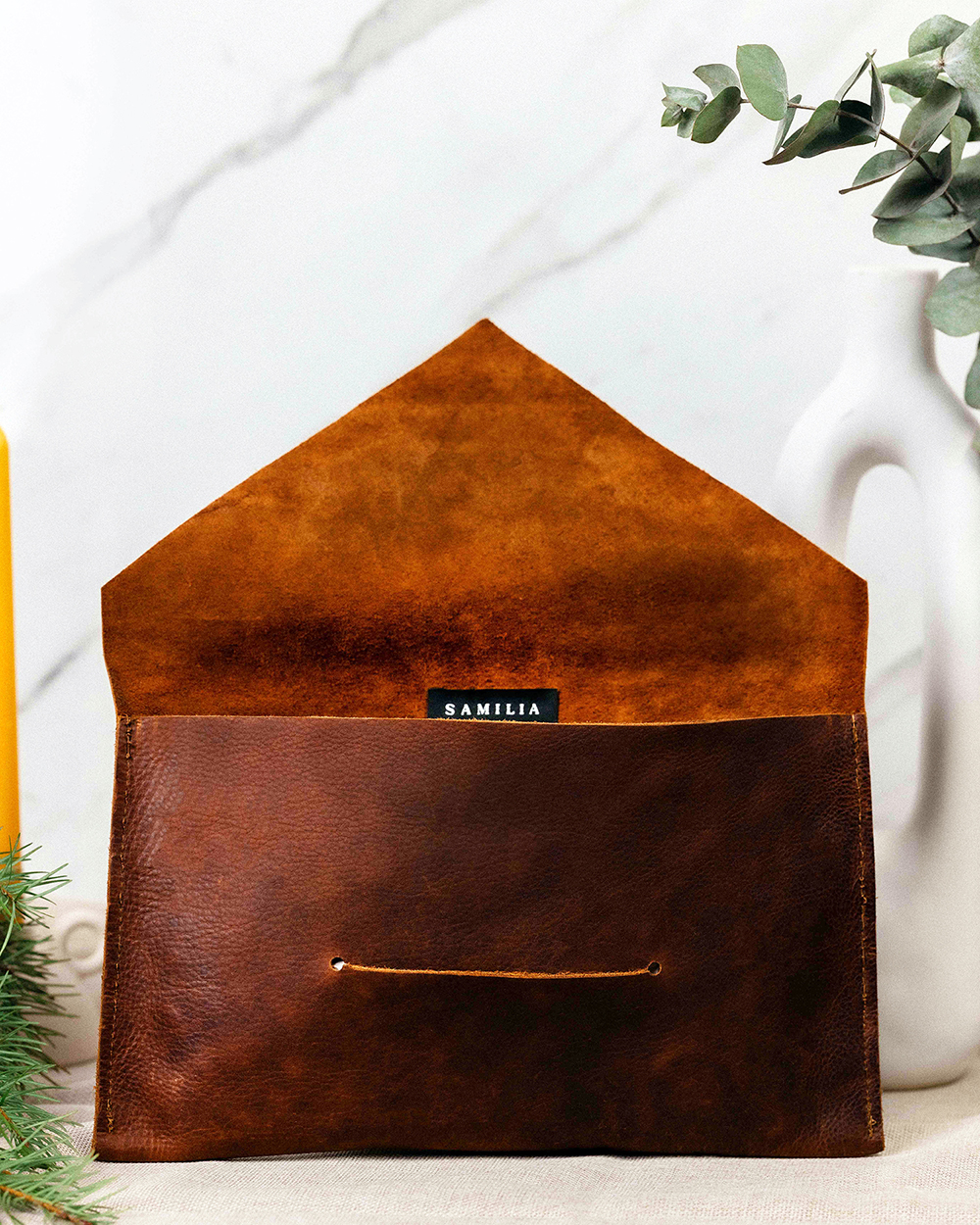
Colar started out solely making handbags. But little by little, she expanded her brand to encompass other pieces of fashion.
“I really started with handbags, and then apparel, making things for myself and my kids, and anytime I would have something, people would say, ‘Can you make me one?’ or ‘Can you make me an outfit?’ And that’s how that came about,” she says.
Colar’s work is filled with duality. While the fabrics pay homage to her African heritage, they also encapsulate the vibrancy she’s always been drawn to. Her most recent line of streetwear-inspired looks combines repurposed denim and Ankara fabric.
“I always loved duality,” Colar says. “I like combining the vibrant fabric with something toned-down or neutral or something refined. Combining that with something a little distressed — I just love that juxtaposition. I think it brings interest to whatever you’re wearing.”
The decision to pair repurposed denim with her beloved fabrics not only demonstrates her versatility as a designer but exemplifies the responsibility she holds as a designer. She seeks to be a part of sustainable change, and part of that requires her to ensure her pieces are a reflection of that.
“It’s important for me to consider sustainability in my practice because I do a lot with younger generations,” Colar says. “I teach workshops all throughout the year. I’m teaching all ages, from youth on up to adults, but with the youth that I have in my workshops, since they are the next generation, I want to be able to instill [in them] and practice what I preach with sustainability. If we’re not teaching it, then where is it going to go when we’re not in the field anymore?”
And she recognizes these decisions not only impact the people in her community, but the industry as a whole.
“You never know who’s watching you, who’s looking at your post, who might engage with you, and what years they have,” Colar says. “It’s just a great way to change how things are, if it’s not working, and to have impact.”
For more info, visit texstylebags.com.
Brezerk
Breana Mitchell describes herself as an artist. Art is personal, and it affects her life in many ways.
“I put my hands in a lot of things dealing with creativity,” Mitchell says.
Known around the city as Brezay, Mitchell is a pop star, excelling in singing, songwriting, and dancing. And it’s no surprise a pop star would have a hand in crafting their own look and image. But Mitchell knew she wanted to be a part of fashion, and not just someone who rocked it.
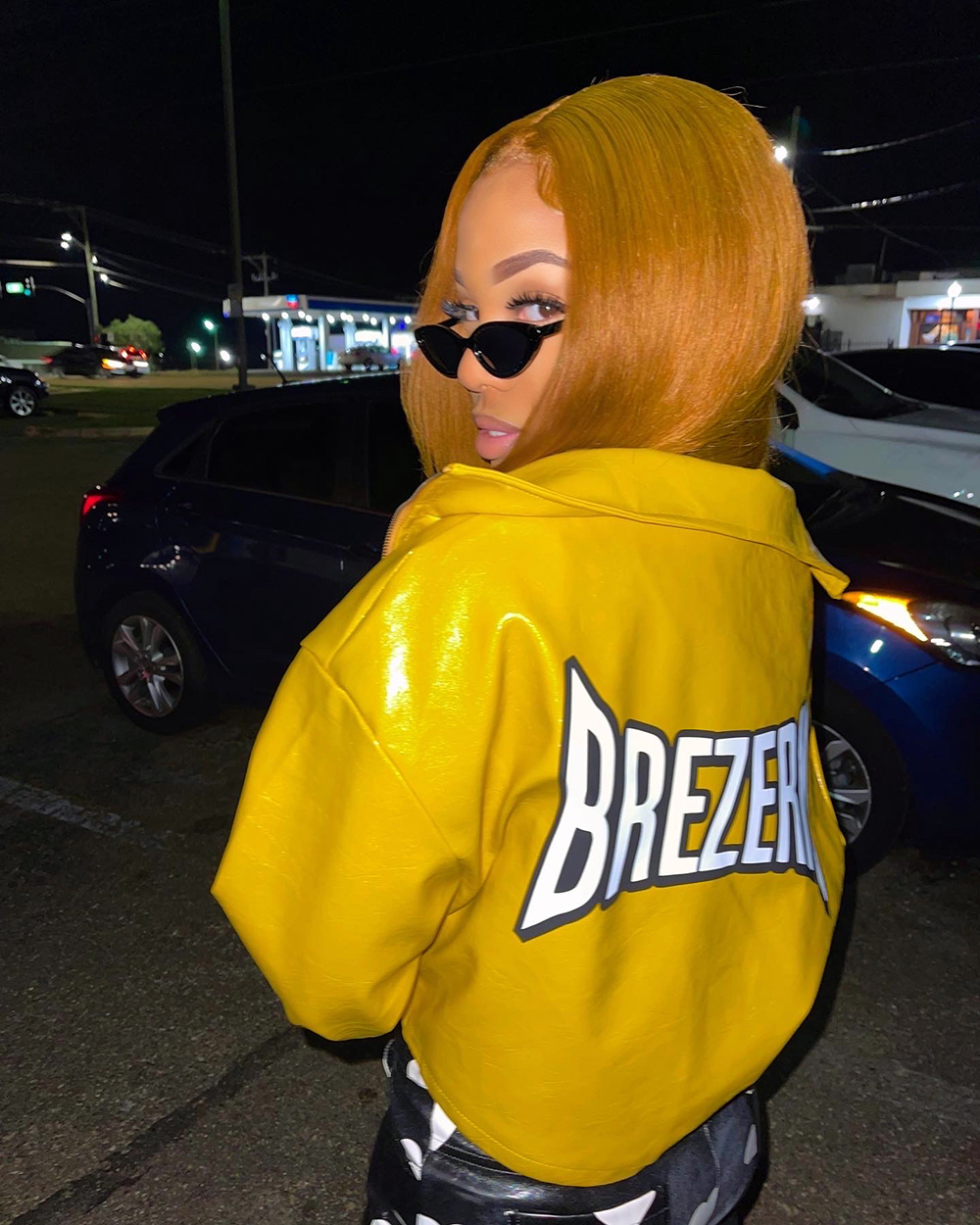
The 23-year-old launched her clothing brand, Brezerk, while enrolled in college at Jackson State University. The brand’s name, one might notice, is a fusion of the designer’s own name and the word “berserk.”
“The original vocab for that means ‘go crazy, insane,’ something like that,” Mitchell says. “Every time I would put on some clothes, the first thing people would say is, ‘Oh, your clothes go crazy. Where’d you get that from?’ So I was like, ‘Let me put my initials into berserk,’ and I ended up coming up with Brezerk.”
As a self-imposed trendsetter, Mitchell says hopping on trends begins and ends with dance challenges, not her clothing. She prides herself on deviating from the norm when it comes to fashion and “not copying anybody.” Her style is reflective of her inclination to stand out, and so are the pieces from Brezerk.
“I’m not really a trendy person,” Mitchell admits. “I really like to create stuff that is different and starts the trend. I base my clothes off of trying to be different.”
At times, though, that can be difficult, Mitchell adds. “I want to be different, but I still want it to look good and make sense.”
Mitchell draws from her personal experiences, as well as the city that raised her, when creating pieces. Her brand’s “Homemade” shirts remain a local crowd favorite.
“A lot of people from Memphis really love that shirt,” she says. “Memphis is how a person is.
“If you’re raised in Memphis, you’re a certain way when you go out of town. I’m homemade. I’m original. I came from Memphis. I based that off the city.”
For more info, visit brezerk.com or find @brezerkclothing on Instagram.
Juss Vibe
Scrolling Juss Vibe’s Instagram (@jussvibez_), you’ll find an infinite feed of Memphians who “put that sh*t on.”
Both the page and the clothing brand of the same name are all about community — and were born out of the spirit of collaboration. The brand is the brainchild of five friends — Torrey Washington (23), Antonio Webster (21), Gregory Webster (24), Kameron Jackson (24), and Demarcus Williams (22) — who “shared a dream of creating something that transcended their individual selves.”
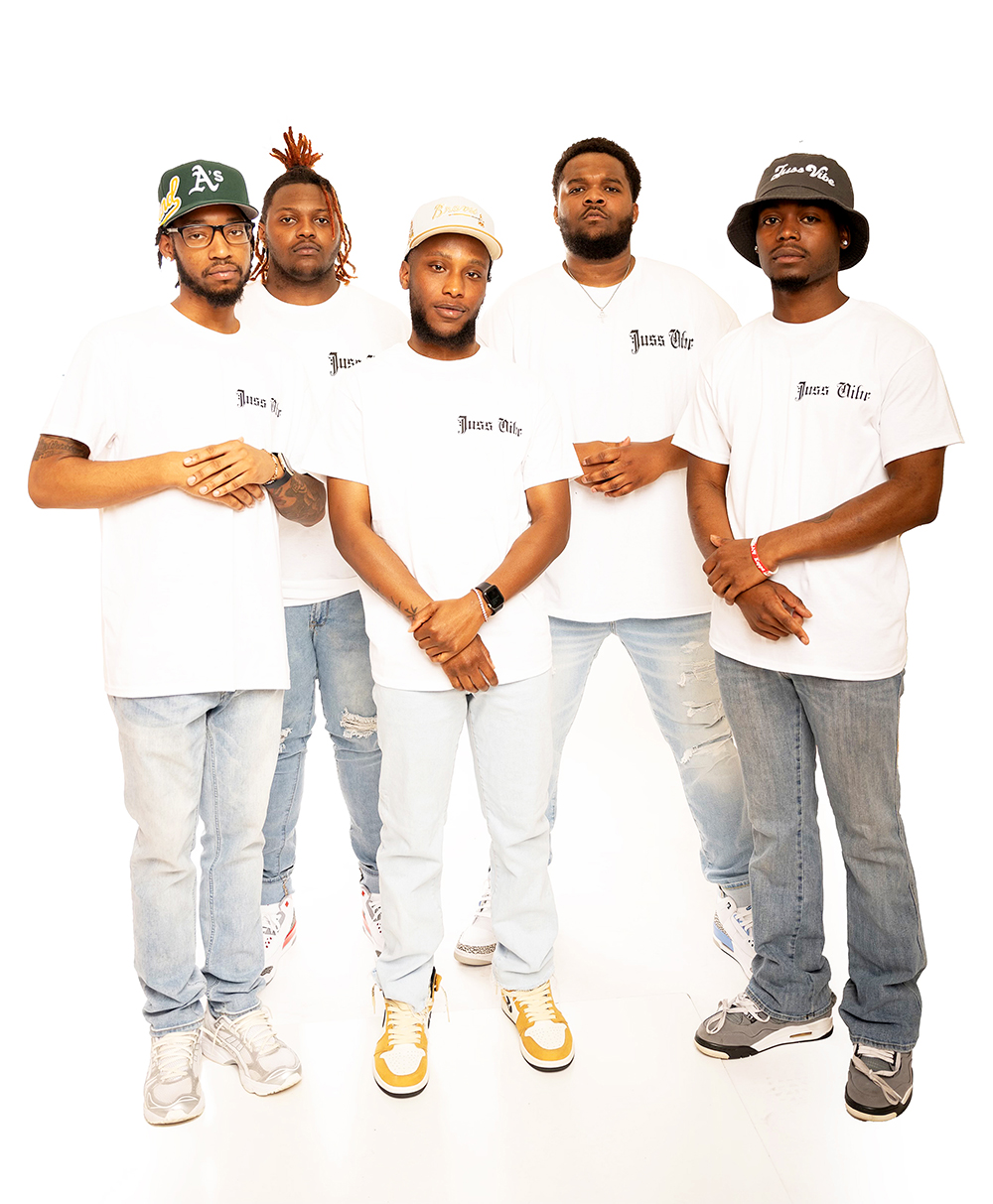
“If I was to describe Juss Vibe to someone who doesn’t know nothing about it or ever even heard the word, I’ll just say it’s a cool little clothing brand,” Washington says. “Just promoting vibes. Promoting good clothes — just going about life.”
The brand is the product of people who sought to make something of themselves while also creating affordable and accessible clothing for their peers and community. The name speaks to their mission, which is more a way of life, they say.
“Positive vibes. Just putting out good energy,” Gregory says.
You’ll find the signature saying on a number of the brand’s pieces, such as their breast cancer awareness collection and their bucket hats and tees. They even put their own spin on University of Memphis game-day apparel, not only to celebrate their school but also to “represent their community as a whole.”
The group has found a way to master the art of virality, making it work for their online presence and brand in tandem. With the brand’s inception, they hadn’t set out to make clothes that appealed to the masses. But their signature duffle bags and hoodie quickly fell among the hottest pieces of streetwear. Soon after, their page was flooded with requests from people wanting to be featured sporting the brand’s newest apparel.
While having an impressive following proved to be integral to their brand visibility, its popularity can be traced to its mission to “empower individuals to embrace their unique vibes.”
For more info, visit jussvibe.com.
